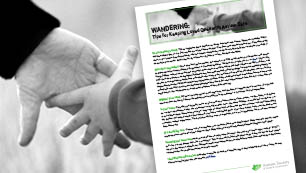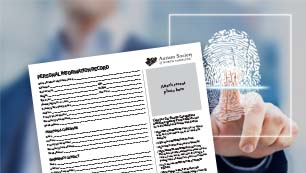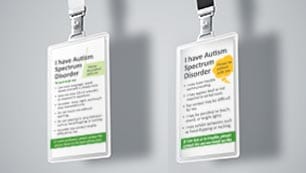The Autism Society of North Carolina wants to partner with you to keep your loved one with autism safe. Here are some concerns you may have; contact your Autism Resource Specialist for more information.
Wandering
Children with autism are more likely to run from caregivers than other children; so much so that the problem has been given many names: wandering, elopement, bolting. They might have phobias or sensitivities that make them likely to run away in certain situations. Once they have escaped supervision, their fascinations can prove deadly, drawing them to water, trains, construction vehicles, or traffic. Click here to read a study published in the journal Pediatrics about children with autism and their tendency to wander.
Children on the autism spectrum also are likely to have characteristics that make it difficult for them to return to safety. They might have poor judgment, not recognizing where or from whom to seek help. Their problem-solving skills might be impaired by rigid thinking, lack of perspective, or anxiety. They might not be able to speak at all or communicate effectively to tell those who find them where they belong.
Given this very real risk to our loved ones with autism, what can parents and caregivers do to keep them safe?
We have gathered some resources that we think can help.

Tips sheet on wandering prevention for parents and caregivers

Printable “Personal Information Record” to share with first responders

Social narratives to teach individuals how to be safe

Links to safety products you can purchase.
Encourage local first responders to view this video and schedule an ASNC training.
Encourage adults with autism to view this video and learn safety tips and ideas.
For caregivers: learn about general safety considerations, how to be proactive, and where to find safety resources.
Other Safety Concerns
“Person with Autism” decals: To request a decal (free for NC residents) to be used in the windows of motor vehicles or your home to alert first responders that occupants might not respond in a typical manner, click here.
911: Does your loved one with ASD know how and when to dial 911? Do they know what to say to an emergency operator? If you can, teach them these skills; often social narratives can help in these efforts. A visual or written explanation near phones in your home can provide cues during emergencies.
First responders: Individuals with autism might be wary of first responders, especially in stressful, chaotic situations. Help your loved one become familiar with EMS, firefighters, and police officers by taking them to headquarters and talking to the officers. Social narratives can also help with this.
Fire: Does your loved one know what to do in case of a fire? The National Fire Protection Association website can help your family be prepared. The website has activities for children and a social narrative that can be individualized.
Driving: All new drivers must undergo training, but for those with autism, additional coaching might be beneficial. Individuals with autism might not respond properly to officials in a situation such as a traffic stop or car accident. One of our “Person with Autism” decals on the car can alert first responders, and drivers can also carry and show one of our ID cards that identifies them as having ASD. Order both for free below.
Internet: For individuals who lack social skills or judgment, safety measures should be put in place to manage Internet access – whether at home, school, or in the workplace. If you have a child or young adult who is visual, place instructional picture cards directly on the computer. If they can read and understand written language, keep those rules next to the computer and negotiate an Internet use contract. Check with your ISP on safeguards. The NC Department of Justice website contains several tips and helpful information for parents about Internet safety.
Stranger Danger: All children must be taught to be careful of strangers, but for individuals with autism, it can be hard to even judge who is a stranger and who is not. Does your child go to the bathroom in public places by himself? Most women do not realize that bathroom etiquette differs for men and women. Women frequently make conversation with people whom they may not know in a public restroom; this is not true for men. Children, especially boys, need to know not to talk to strangers in public restrooms and what to do if a stranger approaches them.
Bullying: Children with autism often face bullying in their schools and neighborhoods. For our bullying toolkit, which includes signs your child is being bullied, steps to take, prevention tips and more, click here.
We also encourage you to contact our Autism Resource Specialists for more assistance; find one near you by clicking here, or contact us at 919-743-0204 or info@autismsociety-nc.org.
Let’s work together to keep our loved ones safe.


